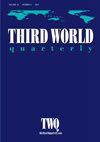扩大区域间主义的概念:超越国家中心主义和欧洲中心主义
IF 1.8
2区 经济学
Q2 DEVELOPMENT STUDIES
引用次数: 0
摘要
除了双边合作之外,南南合作(SSC)的一个日益相关的层面是区域组织之间互动的扩散。然而,对区域间主义的研究往往表现出欧洲中心主义的偏见和以国家为中心的方法,因为它们在分析中经常忽视非国家行为体。本文试图将区域间主义的概念扩展为一种全球现象,这种现象以互惠的方式与区域主义相互联系,并由涉及国家和非国家行为者的不同区域间主义层次之间的相互影响所驱动。文章使用了来自拉丁美洲、非洲、阿拉伯世界和欧洲的实证例子,发现区域组织之间的正式合作对区域主义有更大的影响,特别是在不对称的环境中。与此同时,区域间民间社会合作的出现仍然与国家驱动的区域间主义的存在密切相关,无论是作为赞助者还是共同的对手。本文章由计算机程序翻译,如有差异,请以英文原文为准。
Broadening the concept of interregionalism: beyond state-centrism and Eurocentrism
An increasingly relevant layer of South–South cooperation (SSC) is the proliferation of interactions between regional organisations, in addition to bilateral cooperation. However, studies on interregionalism often exhibit a Eurocentric bias and a state-centric approach, as they frequently overlook non-state actors in their analyses. This article seeks to expand the conceptualisation of interregionalism into a global phenomenon that is interlinked with regionalism in a reciprocal manner, and that is driven by the mutual impact between different stratifications of interregionalism, involving state as well as non-state actors. Using empirical examples from Latin America, Africa, the Arab World and Europe, the article finds that formal cooperation between regional organisations has a more substantial impact on regionalism, particularly in asymmetric settings. Meanwhile, the emergence of interregional civil society cooperation remains closely tied to the existence of state-driven interregionalism whether as a sponsor or a common adversary.
求助全文
通过发布文献求助,成功后即可免费获取论文全文。
去求助
来源期刊

Third World Quarterly
DEVELOPMENT STUDIES-
CiteScore
4.10
自引率
15.00%
发文量
137
期刊介绍:
Third World Quarterly ( TWQ ) is the leading journal of scholarship and policy in the field of international studies. For almost four decades it has set the agenda of the global debate on development discourses. As the most influential academic journal covering the emerging worlds, TWQ is at the forefront of analysis and commentary on fundamental issues of global concern. TWQ examines all the issues that affect the many Third Worlds and is not averse to publishing provocative and exploratory articles, especially if they have the merit of opening up emerging areas of research that have not been given sufficient attention. TWQ is a peer-reviewed journal that looks beyond strict "development studies", providing an alternative and over-arching reflective analysis of micro-economic and grassroot efforts of development practitioners and planners. It furnishes expert insight into crucial issues before they impinge upon global media attention. TWQ acts as an almanac linking the academic terrains of the various contemporary area studies - African, Asian, Latin American and Middle Eastern - in an interdisciplinary manner with the publication of informative, innovative and investigative articles. Contributions are rigorously assessed by regional experts.
 求助内容:
求助内容: 应助结果提醒方式:
应助结果提醒方式:


